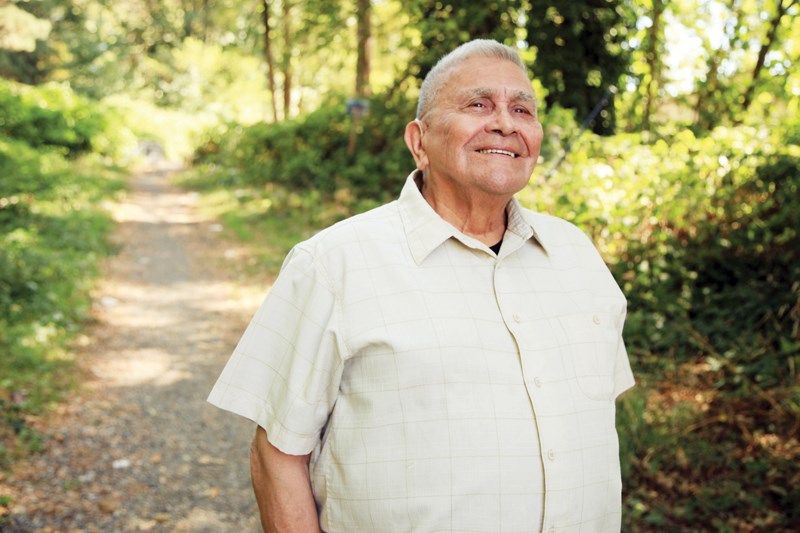“All truly great thoughts are conceived while walking.”
– Nietzsche
The doors of St. Clement’s Anglican Church will be closed this Sunday, but that doesn’t mean the congregants won’t worship.
“We’re going to worship by walking,” explains Lynne McNaughton, the church’s priest.
McNaughton and a squad of Anglicans and Lutherans are planning to take part in the 2017 Walk for Reconciliation on Sunday morning at Queen Elizabeth Plaza, a full-day event that will also include speakers, blankets, murals and lacrosse.
The event is designed to unite a diverse crowd of Canadians with the aim of working toward a more just and humane nation, explains hereditary Gwawaenuk First Nation Chief Robert Joseph.
Joseph had the idea for Vancouver’s first reconciliation walk in 2013 – although he wasn’t sure he’d be able to take part.
It was a time when the extent of the damage wrought by the residential school experience was evolving and Joseph thought it was time for something big.
“I had spoken to my daughters earlier and said, ‘You know, we ought to have a big walk because they’re powerfully symbolic when you get lots of people walking in unity.’”
But just around that time Joseph found himself bedridden while being treated for colon cancer.
But with help from his daughter and some spirited organizers, they put together not only a walk but a series of community get-togethers so participants could talk about the prejudice faced by Jewish people, the Chinese head tax, and the Komagata Maru; all those experiences where reconciliation was required, Joseph explains.
“Lo and behold, we held the walk.”
Approximately 70,000 Canadians marched in 2013 and they did it amid a downpour, Joseph remembers.
“I looked at it as a strong signal to Canadians across the country,” he says.
Speaking from the Xwemlch’stn reserve where he’s lived for the last 20 years, Joseph discusses the scope of the walk.
“Reconciliation is not just for Native people, it’s for all Canadians,” he explains. “We’ve been marginalized long enough, we’ve been isolated long enough, we’ve been separate long enough. It hasn’t worked, so we know that the way forward is to find places with everybody else in Canada together side by side.”
Canada’s colonial history – which includes germ warfare and genocide – can be challenging to acknowledge, Joseph says.
“We’ve had such a difficult history together and many Canadians – when they discovered what our colonial experience together was – find it abhorrent. Some are ashamed, some don’t want to hear about it.”
However, the walk isn’t intended to solely be a history class. Participants are invited to share their stories and their vision “for what a future might look like for all of us,” Joseph explains.
The walk is also about other aspects of reconciliation, Joseph says, such as reconciling development practices with the protection of the environment.
When his optimism is mentioned, Joseph responds: “You’re darn right. You’ve gotta be!
“What if nobody spoke in that fashion? We’d all be status quo, hating each other
. . . No, we’ve got to speak up.”
. . .
There was a time when the subject of reconciliation was the exclusive domain of the social studies department, explains Argyle Secondary principal
Michael Kee.
However, that’s changing as staff put forth a concerted effort to recognize the territories where we all live, he says.
For example, a science class that deals with the immune system might deal with the smallpox outbreaks that decimated Canada’s Aboriginal population, notes Argyle science teacher Heather Reid.
Reid, who also serves as Aboriginal support worker at the school, says she can see the effect the lessons have on students.
“I think they all understand how much of a scar it is on Canadian history.”
Some of those issues can even be broached at an early age, notes Brockton School kindergarten teacher Janet Richards.
While being “very respectful of the age of one’s audience,” teachers nonetheless have a responsibility not to gloss over history, explains Richards.
“The first day of kindergarten it’s my job to lay the building blocks and the foundations for mutual respect,” she says. “I think when you lay that foundation you can address issues like reconciliation with much more of an open mind and with much more awareness.”
Canada’s history can be explored through stories, she says, explaining that she’s preparing a unit that focuses on cultural celebrations.
“If you celebrate it’s a form of uniting a community.”
. . .
“Having another walk will re-inspire us, remind us of our commitment to each other to find a new way forward as Vancouverites, British Columbians, and of course all Canadians,” Joseph says.
It’s a segment echoed by McNaughton.
“It’s a way of working in every way we can to support Indigenous people in their own self-determination,” she says of the walk.
Canada bears responsibility for something horrifying, she says, explaining why her team, North Vancouver Anglicans and Lutherans, is planning to make the walk Sunday.
“We’re putting our feet where our mouth is.”
Perhaps due to the history of broken treaties, Joseph is adamant reconciliation can’t be satisfied with a simple agreement. Instead, all segments of society need to talk to each other and gain some sort of mutual understanding.
And when that happens, the possibilities are great, according to Joseph.
“We’ll begin to really truly live up to the ideals that we already embrace; we’re peace-loving, we’re inclusive, we’re just, we’re compassionate . . . we’re going to give new meaning to that,” he says. “I want to invite all Vancouverites to please take the time on Sept. 24 to come and walk, not only with us, but with each other.”



